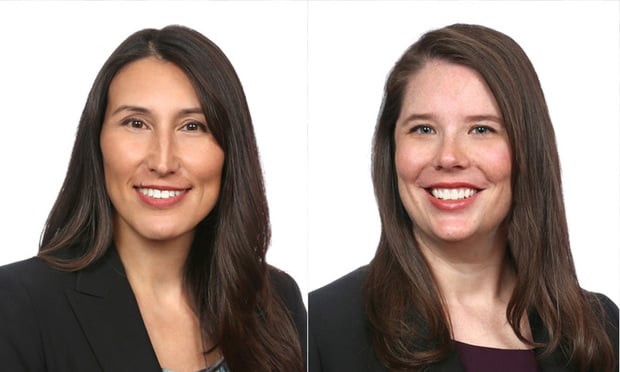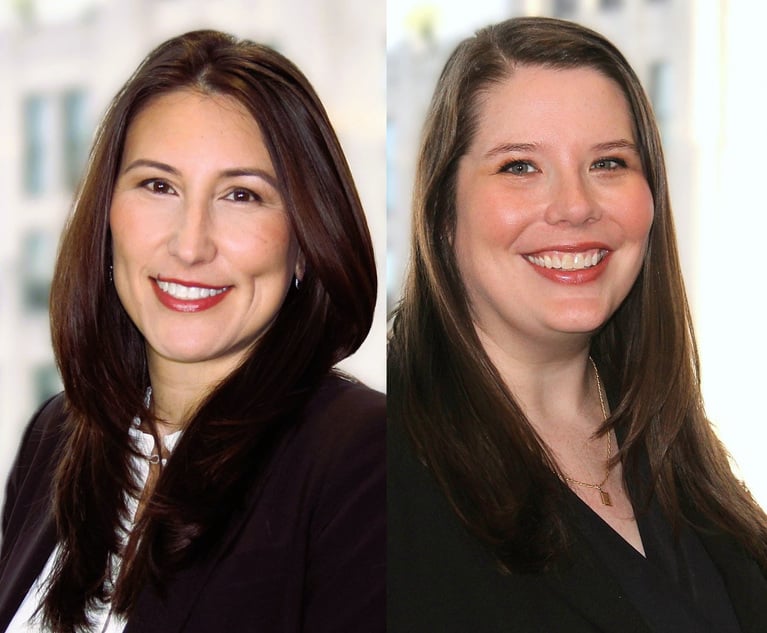Yes, It's Still Only August, But You Can Avoid the Year-End Rush on Billing Issues
Though December may be the appropriate time for the final push, summer can be the time to reinforce the fundamentals for effective fee collections.
August 27, 2018 at 12:23 PM
6 minute read
 Shari Klevens and Alanna Clair, Dentons.
Shari Klevens and Alanna Clair, Dentons.
Issuing bills and collecting fees can be a challenging task for many attorneys. Some find it difficult to give billing issues the attention they need, given the demands of their law practice.
Often, attorneys may feel tempted to ignore billing issues until the year-end collections push. However, by only focusing on billing at one time during the year, attorneys (and firms) may end up leaving earned fees on the table or could otherwise miss red flags that could indicate other problems with the representation.
Thus, many firms will encourage their attorneys to take a serious look at outstanding invoices, work in progress fees and overdue accounts prior to the year-end push. Although December may be the appropriate time for the final push, summer can be the time to reinforce the fundamentals for effective fee collections.
Are Bills Being Paid?
Assuming that bills are sent regularly, if a client is not paying its invoices regularly or in full, this time of year can be a helpful time to investigate. Waiting until December may leave the firm with fewer options and little time to deal with unpaid bills.
Clients have many options for how and when they pay bills. Some clients review amounts or even appeal the invoices before paying. Others may regularly let bills accumulate and pay them in full quarterly. However, the failure of a client to pay over an extended period of time can indicate a problem, either with the client's ability to pay, or, in some circumstances, with the relationship.
If bills are remaining unpaid, many attorneys will investigate to try to identify the source of the delay. For example, the bills might have been sent to the wrong person or, it could be that the firm or the invoices are not in the client's system.
On the other hand, it could be that a client is receiving the bills, but nonetheless is refusing to pay some or all of them. When this happens, there are several potential explanations.
Some clients refuse to pay because they dispute the amount of the bill. In such a circumstance, the attorney may choose to engage in some frank discussions regarding the work performed and anticipated future work and billings. Getting everyone on the same page about both the amount of work a matter requires and the cost of that work is important to avoid even bigger disputes down the road. The attorney may choose to discount or write-off amounts—as a client service issue—if the amounts exceed what was expected.
However, if the client is refusing to pay because the client is dissatisfied with the quality of work, then additional steps may be helpful. Typically, ignoring such dissatisfaction does not make the issue go away and can get worse with time. Most firms in this situation will confront the issues directly to determine whether the client is unfairly refusing to pay or if there is a more serious quality issue.
Most often, fee disputes reflect misunderstanding about what work the attorneys are doing and what costs are associated with that work. If a client does not understand a bill or thinks they are being overcharged, it might be because the bill does not provide enough detail or because it is hard to read. The solution could be as simple as revising billing entries so they provide more information. Unfortunately, sometimes nonpayment means the client simply does not have the financial resources to pay. It is always better to find that out sooner rather than later.
Are Bills Being Sent?
In taking inventory of accounts receivable and work in progress fees, law practices can also review whether their invoices are being sent on a regular basis. Whether fees are being paid can be directly impacted by whether attorneys are getting their bills out with regularity.
Failing to send bills regularly can have direct and practical impact on the attorney-client relationship. If bills are not sent regularly, sending an invoice that encompasses several months of work can come as an unpleasant surprise to a client. A client may even begin to question the work that has already been completed if irregular bills suggest that the representation is unusually expensive. Typically, an effective way to avoid that surprise is to ensure invoicing is timely. Monthly, digestible bills reduce the risk of a fee dispute and increase the chances of prompt payment. Regular invoices also help educate and confirm for clients what tasks are being completed in the matter.
In addition to ensuring good client relations, regular bills avoid the risk that the firm or practice has a substantial amount of fees invested before learning that it has a client problem or an objection to payment. With frequent, regular bills, nonpayment or fee disputes typically involve a much smaller amount than disputes resulting from a single bill covering six months or a year of legal fees and expenses. Issuing bills in regular (and therefore smaller) amounts reduce the risk of a dramatic hit to the bottom line if there is a dispute.
With all that said, one of the most important reasons for monthly or regular billing is to address one of the most common reasons why clients do not pay: they never received an invoice. Systematic billing in regular intervals ensures that crucial step for getting paid by ensuring that bills are sent.
Billing is one way of informing the client of the work being done and the time being spent on their case. By assessing billing issues at mid-year, attorneys can reduce the stress of the year-end collections crunch.
Shari L. Klevens is a partner at Dentons US in Atlanta and Washington and serves on the firm's U.S. board of directors. She represents and advises lawyers and insurers on complex claims and is co-chair of Dentons' global insurance sector team.
Alanna Clair is a partner at Dentons US in Washington and focuses on professional liability and insurance defense. Shari and Alanna are co-authors of “The Lawyer's Handbook: Ethics Compliance and Claim Avoidance” and the upcoming 2019 edition of “Georgia Legal Malpractice Law.”
This content has been archived. It is available through our partners, LexisNexis® and Bloomberg Law.
To view this content, please continue to their sites.
Not a Lexis Subscriber?
Subscribe Now
Not a Bloomberg Law Subscriber?
Subscribe Now
NOT FOR REPRINT
© 2025 ALM Global, LLC, All Rights Reserved. Request academic re-use from www.copyright.com. All other uses, submit a request to [email protected]. For more information visit Asset & Logo Licensing.
You Might Like
View All

CFPB Proposes Rule to Regulate Data Brokers Selling Sensitive Information
5 minute read
Trending Stories
- 1Uber Files RICO Suit Against Plaintiff-Side Firms Alleging Fraudulent Injury Claims
- 2The Law Firm Disrupted: Scrutinizing the Elephant More Than the Mouse
- 3Inherent Diminished Value Damages Unavailable to 3rd-Party Claimants, Court Says
- 4Pa. Defense Firm Sued by Client Over Ex-Eagles Player's $43.5M Med Mal Win
- 5Losses Mount at Morris Manning, but Departing Ex-Chair Stays Bullish About His Old Firm's Future
Who Got The Work
J. Brugh Lower of Gibbons has entered an appearance for industrial equipment supplier Devco Corporation in a pending trademark infringement lawsuit. The suit, accusing the defendant of selling knock-off Graco products, was filed Dec. 18 in New Jersey District Court by Rivkin Radler on behalf of Graco Inc. and Graco Minnesota. The case, assigned to U.S. District Judge Zahid N. Quraishi, is 3:24-cv-11294, Graco Inc. et al v. Devco Corporation.
Who Got The Work
Rebecca Maller-Stein and Kent A. Yalowitz of Arnold & Porter Kaye Scholer have entered their appearances for Hanaco Venture Capital and its executives, Lior Prosor and David Frankel, in a pending securities lawsuit. The action, filed on Dec. 24 in New York Southern District Court by Zell, Aron & Co. on behalf of Goldeneye Advisors, accuses the defendants of negligently and fraudulently managing the plaintiff's $1 million investment. The case, assigned to U.S. District Judge Vernon S. Broderick, is 1:24-cv-09918, Goldeneye Advisors, LLC v. Hanaco Venture Capital, Ltd. et al.
Who Got The Work
Attorneys from A&O Shearman has stepped in as defense counsel for Toronto-Dominion Bank and other defendants in a pending securities class action. The suit, filed Dec. 11 in New York Southern District Court by Bleichmar Fonti & Auld, accuses the defendants of concealing the bank's 'pervasive' deficiencies in regards to its compliance with the Bank Secrecy Act and the quality of its anti-money laundering controls. The case, assigned to U.S. District Judge Arun Subramanian, is 1:24-cv-09445, Gonzalez v. The Toronto-Dominion Bank et al.
Who Got The Work
Crown Castle International, a Pennsylvania company providing shared communications infrastructure, has turned to Luke D. Wolf of Gordon Rees Scully Mansukhani to fend off a pending breach-of-contract lawsuit. The court action, filed Nov. 25 in Michigan Eastern District Court by Hooper Hathaway PC on behalf of The Town Residences LLC, accuses Crown Castle of failing to transfer approximately $30,000 in utility payments from T-Mobile in breach of a roof-top lease and assignment agreement. The case, assigned to U.S. District Judge Susan K. Declercq, is 2:24-cv-13131, The Town Residences LLC v. T-Mobile US, Inc. et al.
Who Got The Work
Wilfred P. Coronato and Daniel M. Schwartz of McCarter & English have stepped in as defense counsel to Electrolux Home Products Inc. in a pending product liability lawsuit. The court action, filed Nov. 26 in New York Eastern District Court by Poulos Lopiccolo PC and Nagel Rice LLP on behalf of David Stern, alleges that the defendant's refrigerators’ drawers and shelving repeatedly break and fall apart within months after purchase. The case, assigned to U.S. District Judge Joan M. Azrack, is 2:24-cv-08204, Stern v. Electrolux Home Products, Inc.
Featured Firms
Law Offices of Gary Martin Hays & Associates, P.C.
(470) 294-1674
Law Offices of Mark E. Salomone
(857) 444-6468
Smith & Hassler
(713) 739-1250







